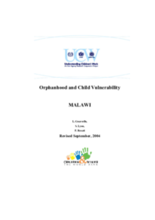A large proportion of Malawian children must grow up in the absence of one or both birth parents. In all, nearly one-fifth (18 percent) of children aged 0-14 years of age are orphans, the highest orphan rate in the Sub-Saharan Africa region. There is also a large group of children, accounting for about 17 percent of total 5-14 year-olds, who are fostered, i.e., children who are not orphans but nonetheless live in a separate household from their parents. This Country Brief explores the links between orphanhood, fostering and child vulnerability. Evidence is presented indicating that orphanhood increases child vulnerability on two fronts: it makes it much more likely that a child is denied schooling and much more likely that a child is exposed to the dangers of work. Becoming a single orphan reduces of probability of attending school full-time by 4.7 percentage points, and increases the probability of attending school in combination with work by about one percentage points. The death of one parent makes it one percentage points more likely that a child works full-time in economic activity and almost 3 percentage points more likely that a children falls into the “inactive” category. Becoming a foster child has even greater effect. The probability of attending school full-time decreases by 5 percentage points and increase by one percent the likelihood that a child will work and by 4 percent the likelihood that a child becomes inactive. On the other hand, becoming a double orphan does not seem significantly influence children’s activity.
©UNICEF and The World Bank

